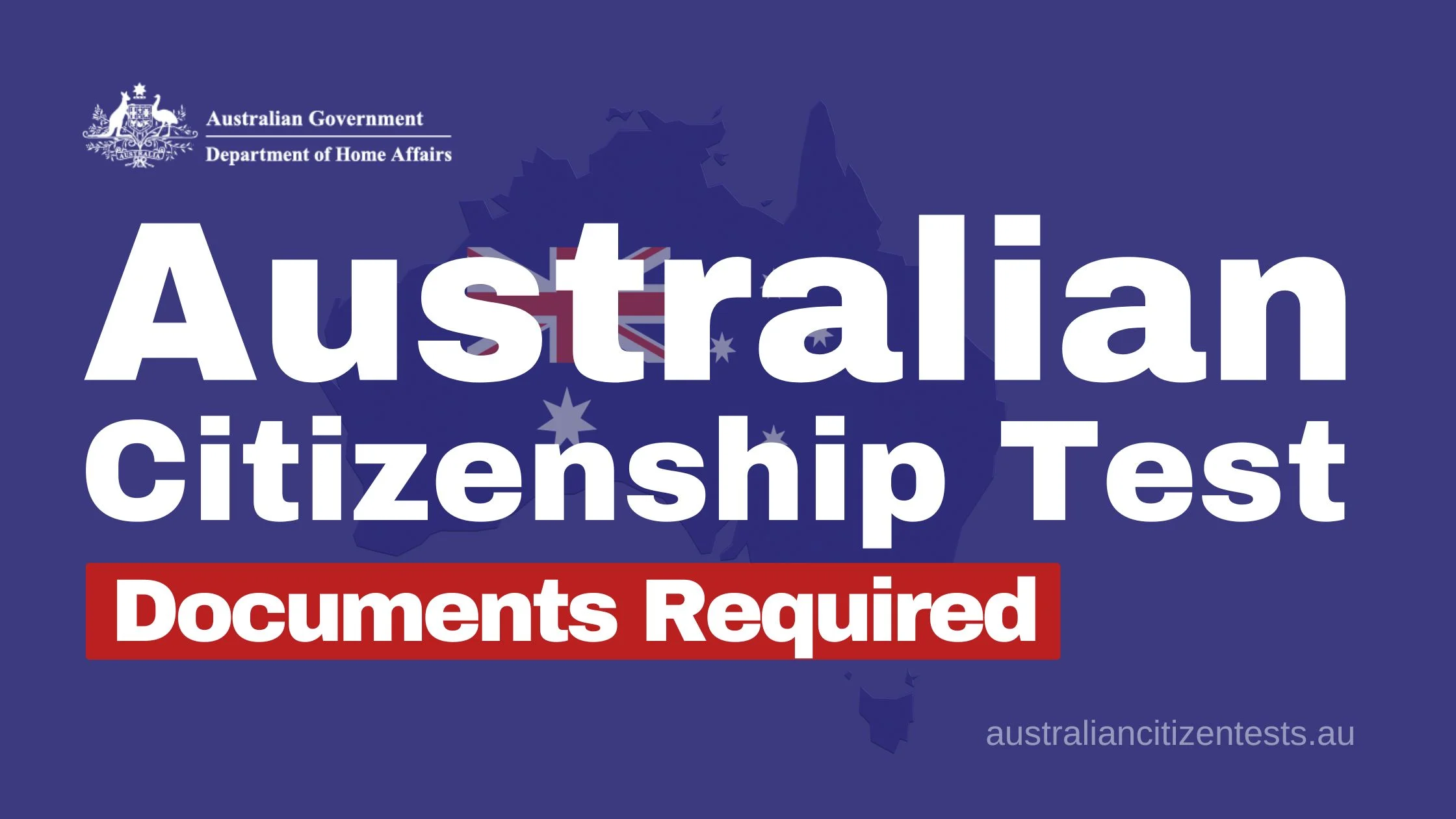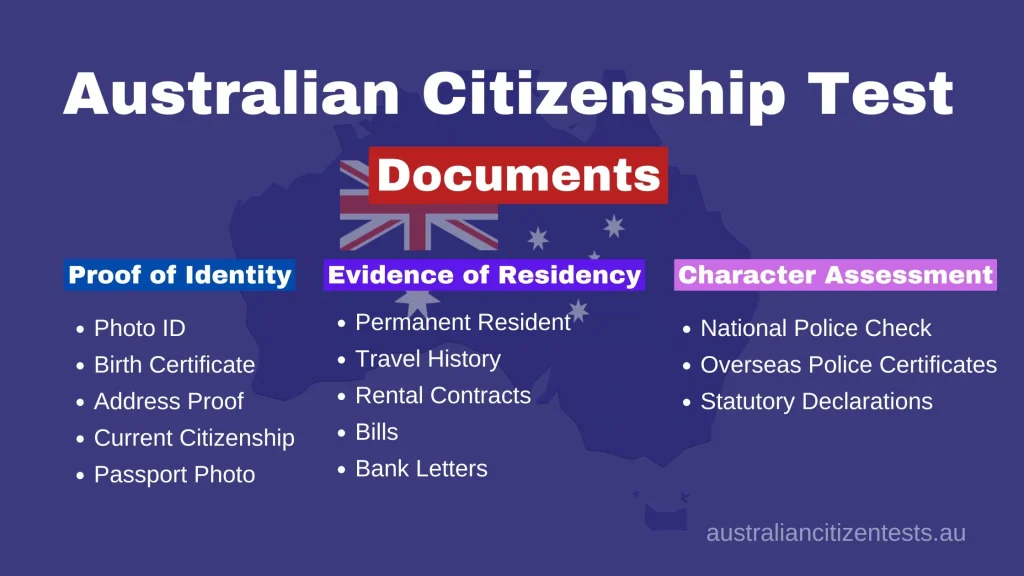
If you’re applying for the Australian Citizenship Test in 2025, you’ll need to submit specific documents. These include a birth certificate or a valid passport (from the Australian Passport Office or another country), proof of your current address (like a utility bill), and sometimes a police certificate if requested. The Department of Home Affairs (DHA) uses these documents, as outlined in the Australian Citizenship Act 2007, to confirm your identity, where you live, and whether you meet Australia’s rules for citizenship. This process helps ensure fairness and clarity for everyone applying.

Proof of Identity
To apply for Australian citizenship, you need to prove who you are. Here’s what to submit:
Core Identity Documents
- Photo ID: A current passport, Australian driver’s license, or Proof of Age Card (must have your photo and signature).
- Birth Certificate: A full certificate showing your birth name, birthday, and gender.
- Name Changes: If your name changed, add a marriage certificate or legal name-change document.
Important Notes
- If documents aren’t in English, include official translations (done by a NAATI-certified translator).
- Lost a document? Write a signed legal statement (statutory declaration) explaining what happened.
Supporting Documents
- Address Proof: Use a utility bill, bank statement, or rental agreement with your name and current address.
- Arrival in Australia: Show old passports or travel records with your first entry date.
- Current Citizenship: Provide proof of your current nationality (e.g., foreign passport).
- Passport Photo: One recent photo with your name on the back.
Evidence of Residency
When applying for Australian citizenship, you need to prove you’ve lived here long enough. Show documents like your permanent residency proof, travel history, and addresses where you’ve stayed.
Visa & Travel Records
- Permanent Resident (PR) Visa Grant Notice: This paper shows when your permanent residency started.
- Travel History: Get your entry/exit records from the Department of Home Affairs to prove you’ve followed the rules.
Tip: Use the Residence Calculator (on the Department’s website) to check if you’ve met the 4-year living requirement.
Address Verification
- Rental Contracts: Lease papers with your name and address.
- Bills: Recent electricity, water, or gas bills with your name and home address.
- Bank Letters: Statements showing your address and transactions.
These papers (citizenship residency documents) help confirm you’ve lived in Australia without long breaks. Double-check dates and details to avoid delays!
Character Assessment Documents
To apply for Australian citizenship, you must show you have good character. This means sharing documents that prove your behavior and background.
Required Documents
- National Police Check: If you’re 16 or older, you need an AFP National Police Check. This shows if you have a criminal record in Australia.
- Overseas Police Certificates: If you’ve lived in another country for 12 months or more (even if not all at once) in the last 10 years, get a police certificate from each country.
- Statutory Declarations: If you can’t get a foreign police certificate, submit a statutory declaration (a signed statement). Explain why you couldn’t get the certificate and what you did to try.
Important Note: If your documents aren’t in English, include a NAATI-certified translation.
Application Forms & Process
To become an Australian citizen, you’ll need to fill out forms and attend an interview. This checks if you meet the rules and understand Australia’s values.
Mandatory Forms
- Form 1300t: For ages 18–59. Submit this form online. Have your documents (like ID and proof of address) ready before starting.
- Form 1290: For under 18, over 60, or if you can’t apply online. Use this paper form and mail it with verified copies of your documents.
Before submitting: Check the online checklist to ensure you have everything. Missing items can delay your application.
Post-Test Interview
After applying, you’ll get an interview invite. This may include a short citizenship test. Bring original documents to the interview, such as:
- Your passport (with travel stamps).
- Employment records (e.g., pay slips or job letters).
The officer will check your papers and ask questions about your application. Prepare by reviewing your details and practising common questions about Australian values.Key Tip: Double-check your forms and documents. Mistakes can slow down the process!
Special Cases & Exemptions
Some people applying for Australian citizenship might not need to take the test or could need extra paperwork. This includes older adults, people with disabilities, or adopted children.
Applicants Over 60 or with Disabilities
If you’re 60 or older, or have a long-term disability, you don’t need to take the citizenship test. You’ll still need to show you understand Australian citizenship basics (like voting and obeying laws).
Required Documentation:
- Medical Reports: If you have a disability, include doctor’s reports explaining your condition.
- Exemption Forms: If your disability makes it hard to understand the citizenship process, ask your doctor to fill out an exemption certificate.
Note: Use Form 1290 for these applications.
Children & Adoptees
Domestic Adoptions (Within Australia):
- Provide the child’s birth certificate and official adoption papers.
- All parents/guardians must sign consent forms.
Intercountry Adoptions (Outside Australia):
- For adoptions under international rules (Hague Convention), submit the official adoption certificate.
- If the child isn’t a citizen yet, apply for citizenship right away.
Note: Use Form 1272 for Hague Convention adoptions.
Additional Documents
When applying for Australian citizenship, you might need extra documents if your personal details (like your name) have changed. Here’s what you’ll need:
Marriage Certificate
- If you changed your name after marriage, submit an official marriage certificate.
- If your certificate isn’t in English, get a translation from an approved translator.
- Ceremonial certificates (like wedding keepsakes) won’t work. Get the official one from the Registry of Births, Deaths and Marriages (RBDM) in the state where you married.
Change of Name Certificate
- For non-marriage name changes (like through a court), get a legal name change certificate from the RBDM.
- This updates your name across government records.
Employment Records
- While not always required, payslips, tax letters, or employer letters can help prove you’ve lived in Australia long-term.
FAQs
Does a Medicare card prove residency?
A Medicare card alone doesn’t prove where you live. You’ll need other documents like a utility bill, bank statement, or rental agreement to show your current address. These help the government confirm you actually live in Australia.
What forms of ID are acceptable in Australia?
You can use a passport, birth certificate, or citizenship certificate as your main ID. For extra proof, a driver’s license, Medicare card, or student ID works. Sometimes, you’ll need to combine these to meet the 100-point ID check, like using a passport plus a bank statement.
Do I need a police certificate for citizenship?
If you’re 18 or older, you must provide police certificates from every country you’ve lived in for more than 90 days since turning 18. This helps prove you have a good character. The government might also check your Australian police record.
What is the citizenship certificate number for a passport?
This number is on your citizenship certificate and is used to apply for an Australian passport. It’s a unique code that confirms your citizenship status. Make sure the details on your certificate match your passport application exactly.
